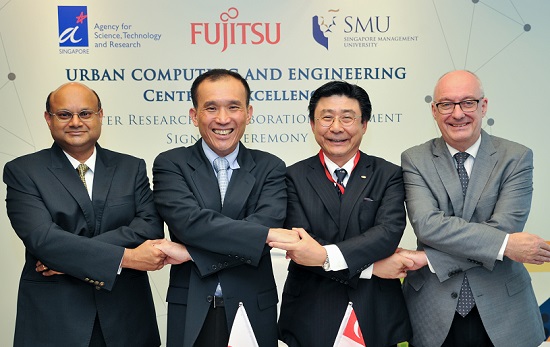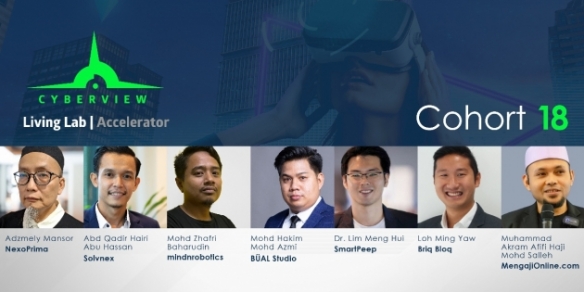Fujitsu in sustainable urbanisation partnership in Singapore
By Digital News Asia October 20, 2014
- To set up Centre of Excellence with A*Star and SMU
- To turn nation into ‘living lab’ using analytics and computational social sciences

FUJITSU Ltd, the Agency for Science, Technology and Research (A*Star) and the Singapore Management University (SMU) have signed a master research collaboration agreement (MRCA) to set up an Urban Computing and Engineering Centre of Excellence in the city-state.
Under the MRCA, a five-year partnership which builds on a Fujitsu-A*Star memorandum of understanding (MoU) signed in Japan in March 2013, the parties will invest S$54 million (US$42.4 million) in the centre, and to work together in addressing the multitude of challenges highly urbanised cities frequently face.
The Centre is also supported by the National Research Foundation (NRF) of Prime Minister’s Office, Fujitsu said in a statement.
With the world’s urban population expected to grow to 70% of the global population by 2050 according to Unicef, cities increasingly face challenges related to high-density living, such as efficient resource usage and traffic congestion, the company said.
Given these issues, the Centre’s objective is to harness high performance computing capabilities to develop solutions for sustainable urban operations such as crowd mobility and transport engineering, with researchers using Singapore as a ‘living lab’ to testbed next-generation solutions to real urban issues.
“This collaboration … pushes the leading edge of public-private partnerships to solve major urban challenges confronting Singapore and many other modern cities today,” said A*Star managing director Dr Raj Thampuran.
“Such issues are complex and dynamic in nature and so a strongly multidisciplinary, multi-organisation approach is imperative where knowhow and talent from public institutions and companies are needed to address the problems facing the future of societies,” he added.
Increasingly, technologies based on the convergence of data analytics, complex system simulation, computational social science, and behavioural science will play game-changing roles in addressing urban challenges, Fujitsu said.
The Centre will initially focus on the following projects, with further themes to be explored over the course of the partnership:
- Dynamic Mobility Management: To develop methods to understand and improve the dynamics of commuter traffic in large urban spaces, as well as manage crowds under extreme conditions and surges, using a new computing platform that combines research in sensing, data management and analytics, modelling and simulation, behavioural modelling and decision support.
- Maritime and Port Optimisation: To study port operation optimisation and design of integrated logistics concepts managing inbound and outbound shipments from port to city, aiming to improve capacity without building new facilities.
A*Star’s Institute of High Performance Computing and Institute for Infocomm Research will contribute capabilities in big data including visualisation and analytics, complex systems, modelling and behavioural science, capabilities in urban data exchange, and machine learning for urban challenges like transport and supply chain management.
Fujitsu will contribute to the development of social innovation solutions, using big data analysis and high performance computing for integrating big data analytics and simulation. Fujitsu will also leverage its research and development (R&D) capabilities from Fujitsu Laboratories to contribute to the Centre’s research.
“The Urban Computing and Engineering Centre of Excellence offers a valuable and unique opportunity for us to engage in cutting-edge research and development by utilising Singapore’s living big data to the maximum, which synchronises with Fujitsu’s approach of Human Centric Innovation,” said Tango Matsumoto, corporate executive officer, executive vice president, and head of Global Marketing at Fujitsu Ltd.
“Also, through this project, we aim to strengthen our relationship with Singapore and hope to contribute to the development of a safer and more secure society,” he added.
SMU’s expertise includes methods and software systems for planning, scheduling and decision making that combine artificial intelligence agent-based modelling and simulation, large-scale optimisation, mechanism design, behavioural economics and computational social science.
“We look forward to contributing our interdisciplinary knowledge and research from across our SMU schools and research institutes to solving complex urban and social problems,” said SMU president Prof Arnoud De Meyer.
“This will enhance SMU’s role in making a positive impact on society by making significant contributions to improving the quality of life of city dwellers,” he added.
The Centre is supported by the Urban Computing and Engineering Corporate Lab @ SMU, funded by the NRF, as the fourth laboratory to be established under the NRF Corp Lab@University Scheme, which supports Singapore’s autonomous universities in their conduct of industry-relevant research with companies as partners.
Related Stories:
Singapore deepens relationship with IBM’s Watson
TCS-SMU extend iCity Lab partnership, gets grant for senior citizen project
From smart cities to ‘sensible’ cities, via IoT
Vision, not technology, the key to better cities: SAP
For more technology news and the latest updates, follow us on Twitter, LinkedIn or Like us on Facebook.


